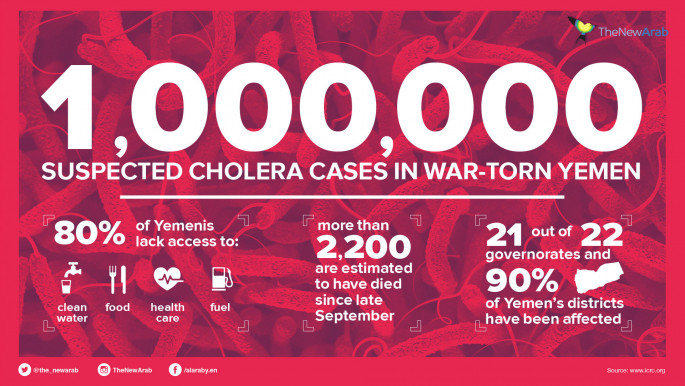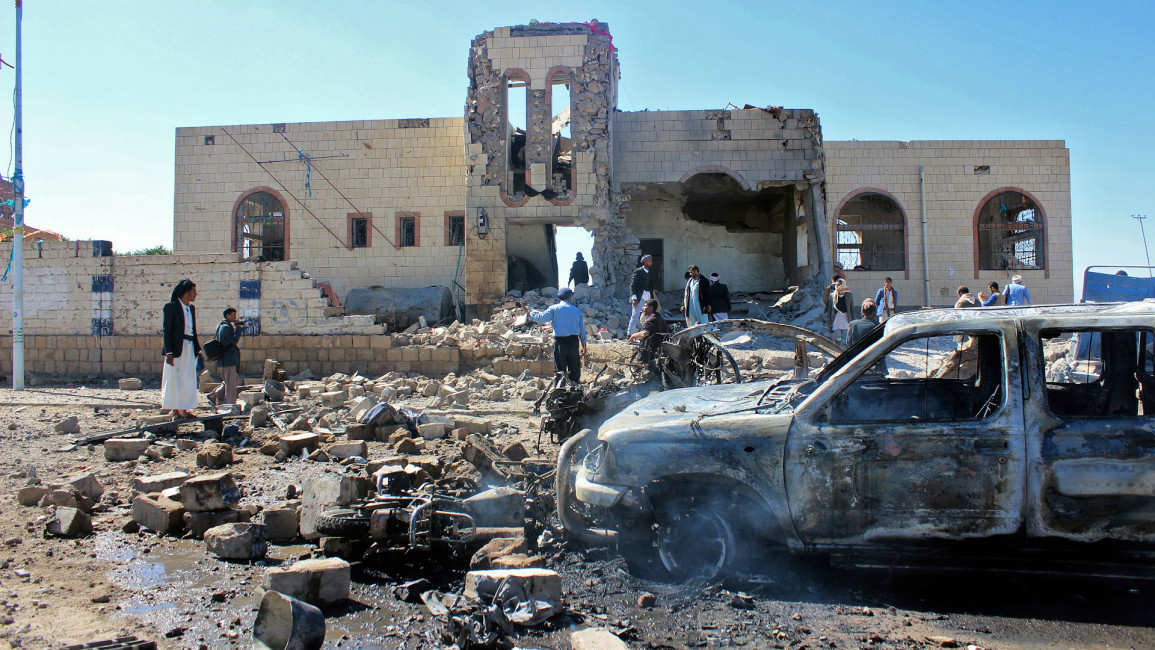
The international community's whitewashing of Yemen
Analysis: A reluctance to criticise Saudi Arabia's military campaign has empowered Riyadh to destroy thousands of Yemeni lives, writes Jonathan Fenton-Harvey.
5 min read
The Saudi-led military action in Yemen has killed thousands and injured many more [Getty]
After more than 1,000 days of war, Yemen's humanitarian situation has rapidly deteriorated. Fresh updates hit our screens of Saudi-led airstrikes on civilian areas.
Riyadh's coalition has imposed a land, air and maritime blockade on Yemen since November, restricting vital humanitarian supplies, while NGOs constantly urge more access for aid to reach civilian areas.
Meanwhile, cholera has hit a million cases - the largest number of cases in a single outbreak in recent history. Other diseases including dipheria have been noted, along with millions of malnourished women, children and men. Yemen's healthcare system has collapsed from the war, making it impossible to contain these otherwise treatable ailments.
It is due to a combination of support and silence from world powers - particularly in the West - towards the Saudi-led military campaign. Without such assistance, Saudi Arabia could not carry out its atrocities.
Now eminent political figures are trying to compensate for the damage caused by showing vague, half-hearted concern for Yemen, without acknowledging their own role in creating the crisis, while still otherwise supporting the coalition's bombing.
In December, US President Donald Trump called for Saudi Arabia to lift the blockade to allow aid in, saying Yemenis "desperately need it". Others within his administration echoed his words.
However, comments from US Defence Secretary James Mattis' are more telling. While again speaking of his concern for Yemenis, saying the US would do "anything we can" to limit civilian casualties, he also declared his continued support for the Saudi-led coalition.
After all, the United States is still the biggest arms seller to Saudi Arabia, previously penning a $110 billion deal to the kingdom.
It is simply contradictory to speak of concern for Yemeni lives and support the actions of the Saudi-led coalition. Reporters including Robert Fisk have observed how the Saudi-led coalition has deliberately targeted civilian areas and agricultural infrastructure, to cripple the country and make it more dependent on external support.
Despite their claims, this has been Saudi Arabia's goal since Yemen became unified in 1990, and even before that. It backed the southern secessionist movement in 1994 to divide the country. A strong, unified Yemen is what many analysts believe Saudi Arabia fears the most.
Following President Trump's comments, the UK International Development Secretary Penny Mordant announced in December $50 million in aid to Yemen from the British government, while calling for the "immediate opening up of commercial and humanitarian access into Yemen".
Prime Minister Theresa May also criticised the blockade, while boasting of previous UK humanitarian donations to Yemen.
While Mordant directed criticisms at the Saudi blockade, she did not address the primary cause of Yemeni suffering: weapons sales to and impunity for the Saudi kingdom's military action.
And of course, the $50 million aid package barely dents the $8 billion or so pocketed by the UK in arms sales since the war started.
As Britain has actually placed military advisers in control rooms for Saudi-led bombing campaigns, while previously having blocked investigations into war crimes in Yemen, it leaves no doubt that the UK knows what the kingdom is doing, and it is complicit in its campaign.
Even French President Emmanuel Macron has warned about the blockade, while continuing France's involvement in selling arms to Saudi Arabia. They are all joined by a wide range of Western/European governments who play lesser but still significant roles in weapons transactions to the kingdom.
Not only do these comments barely scratch the surface of Yemen's suffering, or why people really need aid, they reveal the hypocrisy of those who supply weapons, and who are complicit in Yemen's plight.
Andrew Smith at Campaign Against Arms Trade told me: "These arms sales are about more than shifting weapons. They are also a sign of political support and an endorsement for the regimes they are being sold to.
"The message it sends to those suffering repression is that their human rights don't matter, and that their wellbeing is less important than arms company profits."
Smith is correct. These weapons sales, with knowledge about what they will be used for, are a symbol of direct consent for the Saudi-led violations against the Yemeni people.
Some have condemned weapons sales, including the German Green Party and UK Labour Party leader Jeremy Corbyn. Yet their voices are marginalised by overwhelming US and European governmental support.
It is often argued that if Western nations withdrew weapons sales to Saudi Arabia, the kingdom would simply purchase them elsewhere. Yet as influential global powers, the withdrawal from the market of the US and the UK would set an example for others, and create a precedent for condemning Saudi Arabia.
They could also use their international leverage to negotiate a peaceful settlement in Yemen. This is especially true of Britain as the "pen holder" for Yemen at the UN Security Council, and who therefore holds the most responsibility for peace-making.
It is even conceivable that, for now, seemingly outspoken remarks from mid-level politicians are simply trying to alleviate this renewed pressure from NGOs, the United Nations and others, rather than genuinely caring about the Yemeni people's best interests - especially as they are mostly addressing an area that has had enough international condemnation: the blockade.
There is, however, hope. As there was enough international pressure and awareness to force weapons sellers to Saudi Arabia to condemn the blockade, which resulted in a partial lifting of restrictions, greater pressure to halt arms transfers to the kingdom and remove impunity for its actions could yet achieve just that.
Riyadh's coalition has imposed a land, air and maritime blockade on Yemen since November, restricting vital humanitarian supplies, while NGOs constantly urge more access for aid to reach civilian areas.
Meanwhile, cholera has hit a million cases - the largest number of cases in a single outbreak in recent history. Other diseases including dipheria have been noted, along with millions of malnourished women, children and men. Yemen's healthcare system has collapsed from the war, making it impossible to contain these otherwise treatable ailments.
It is due to a combination of support and silence from world powers - particularly in the West - towards the Saudi-led military campaign. Without such assistance, Saudi Arabia could not carry out its atrocities.
Now eminent political figures are trying to compensate for the damage caused by showing vague, half-hearted concern for Yemen, without acknowledging their own role in creating the crisis, while still otherwise supporting the coalition's bombing.
In December, US President Donald Trump called for Saudi Arabia to lift the blockade to allow aid in, saying Yemenis "desperately need it". Others within his administration echoed his words.
 |
The United States is still the biggest arms seller to Saudi Arabia |  |
However, comments from US Defence Secretary James Mattis' are more telling. While again speaking of his concern for Yemenis, saying the US would do "anything we can" to limit civilian casualties, he also declared his continued support for the Saudi-led coalition.
After all, the United States is still the biggest arms seller to Saudi Arabia, previously penning a $110 billion deal to the kingdom.
It is simply contradictory to speak of concern for Yemeni lives and support the actions of the Saudi-led coalition. Reporters including Robert Fisk have observed how the Saudi-led coalition has deliberately targeted civilian areas and agricultural infrastructure, to cripple the country and make it more dependent on external support.
 |
Despite their claims, this has been Saudi Arabia's goal since Yemen became unified in 1990, and even before that. It backed the southern secessionist movement in 1994 to divide the country. A strong, unified Yemen is what many analysts believe Saudi Arabia fears the most.
Following President Trump's comments, the UK International Development Secretary Penny Mordant announced in December $50 million in aid to Yemen from the British government, while calling for the "immediate opening up of commercial and humanitarian access into Yemen".
Prime Minister Theresa May also criticised the blockade, while boasting of previous UK humanitarian donations to Yemen.
While Mordant directed criticisms at the Saudi blockade, she did not address the primary cause of Yemeni suffering: weapons sales to and impunity for the Saudi kingdom's military action.
And of course, the $50 million aid package barely dents the $8 billion or so pocketed by the UK in arms sales since the war started.
As Britain has actually placed military advisers in control rooms for Saudi-led bombing campaigns, while previously having blocked investigations into war crimes in Yemen, it leaves no doubt that the UK knows what the kingdom is doing, and it is complicit in its campaign.
Even French President Emmanuel Macron has warned about the blockade, while continuing France's involvement in selling arms to Saudi Arabia. They are all joined by a wide range of Western/European governments who play lesser but still significant roles in weapons transactions to the kingdom.
Not only do these comments barely scratch the surface of Yemen's suffering, or why people really need aid, they reveal the hypocrisy of those who supply weapons, and who are complicit in Yemen's plight.
 |
The message it sends to those suffering repression is that their human rights don't matter, and that their wellbeing is less important than arms company profits |  |
Andrew Smith at Campaign Against Arms Trade told me: "These arms sales are about more than shifting weapons. They are also a sign of political support and an endorsement for the regimes they are being sold to.
"The message it sends to those suffering repression is that their human rights don't matter, and that their wellbeing is less important than arms company profits."
Smith is correct. These weapons sales, with knowledge about what they will be used for, are a symbol of direct consent for the Saudi-led violations against the Yemeni people.
Some have condemned weapons sales, including the German Green Party and UK Labour Party leader Jeremy Corbyn. Yet their voices are marginalised by overwhelming US and European governmental support.
It is often argued that if Western nations withdrew weapons sales to Saudi Arabia, the kingdom would simply purchase them elsewhere. Yet as influential global powers, the withdrawal from the market of the US and the UK would set an example for others, and create a precedent for condemning Saudi Arabia.
They could also use their international leverage to negotiate a peaceful settlement in Yemen. This is especially true of Britain as the "pen holder" for Yemen at the UN Security Council, and who therefore holds the most responsibility for peace-making.
It is even conceivable that, for now, seemingly outspoken remarks from mid-level politicians are simply trying to alleviate this renewed pressure from NGOs, the United Nations and others, rather than genuinely caring about the Yemeni people's best interests - especially as they are mostly addressing an area that has had enough international condemnation: the blockade.
There is, however, hope. As there was enough international pressure and awareness to force weapons sellers to Saudi Arabia to condemn the blockade, which resulted in a partial lifting of restrictions, greater pressure to halt arms transfers to the kingdom and remove impunity for its actions could yet achieve just that.
Jonathan Fenton-Harvey is a freelance journalist.
Follow us on Twitter: @The_NewArab
Opinions expressed in this article remain those of the author and do not necessarily represent those of The New Arab, its editorial board or staff.





 Follow the Middle East's top stories in English at The New Arab on Google News
Follow the Middle East's top stories in English at The New Arab on Google News


